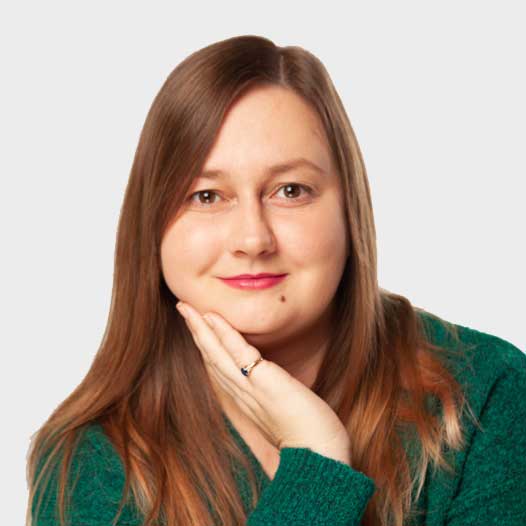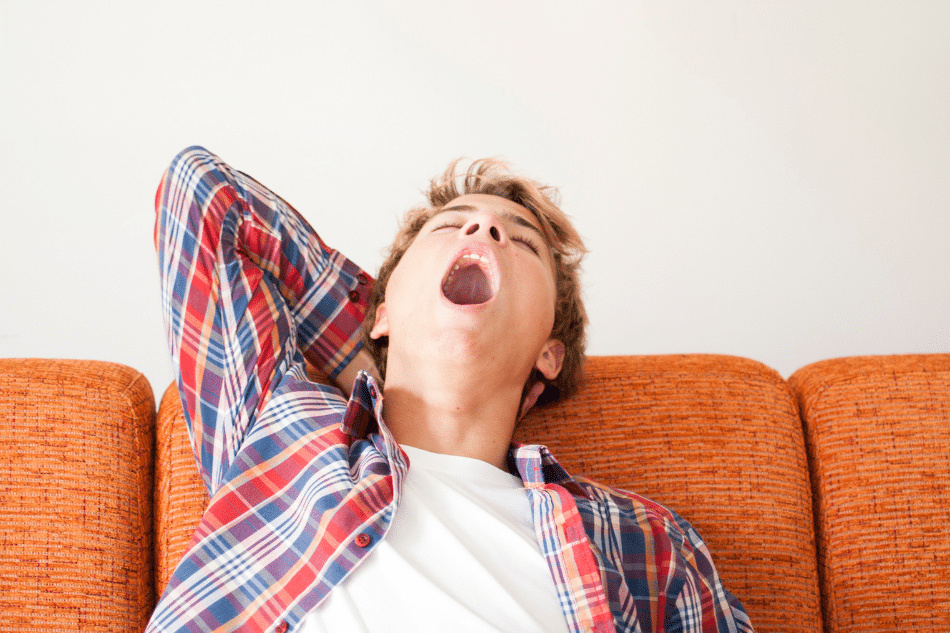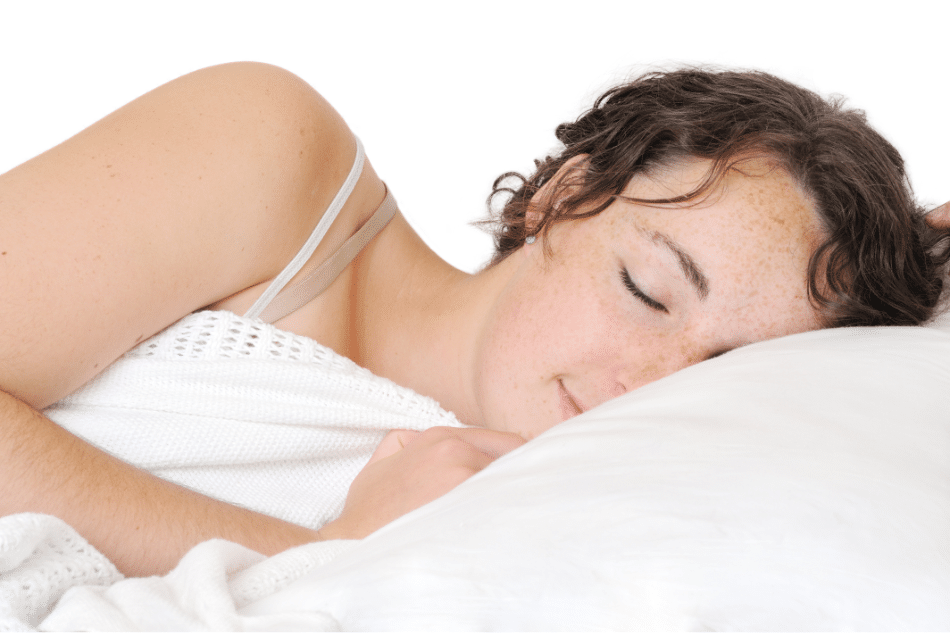Eszopiclone (Lunesta) for Teens: How Does It Work?

Lunesta is known for two key reasons: Helping people drift off to sleep, and leaving a weird, metallic taste in your mouth the next morning. Tasty? Not so much.
Eszopiclone (sold under the brand name Lunesta) is a prescription sleep aid that’s often given to adults struggling with insomnia. So what about Lunesta for treating insomnia in teens? Can it help them too? And is it safe?
In this guide, we’ll walk you through what Lunesta is, how it works, and why it’s used sometimes in teens. We’ll also look at the upsides and downsides of taking it. So, whether you’re curious about taking it yourself or considering it for someone you care about, here’s what you need to know – without any confusing medical jargon.

What Is Lunesta?
Lunesta, put simply, is a medication that’s prescribed to help people sleep better. It’s a type of medicine called a nonbenzodiazepine hypnotic and is usually used short term.1 It can help you to fall asleep and to stay asleep during the night.
Let’s take a look at how it works and what it does in the brain. Your brain has a built-in ‘sleep time’ system that uses a chemical called GABA to slow things down when it’s time to relax. It’s like a built-in dimmer switch to turn down your brain’s activity so you can stop overthinking and fall fast asleep. Lunesta boosts that dimmer switch by helping your brain respond better to GABA. Everything slows down easier, thoughts quieten, and muscles can relax. It’s like turning the lights down and saying “It’s time for bed.”
Lunesta is approved by the U.S. Food and Drug Administration (FDA) to treat insomnia in adults. This means that it has been through many tests to make sure it is safe and efficient at treating sleeping issues in adults, whether that’s problems falling asleep, staying asleep, or both.2
Lunesta doesn’t have FDA approval for children or teens, and it isn’t known if it is safe or effective for them as more research is needed. However, doctors do sometimes prescribe Lunesta for managing stress-induced insomnia in teens.
What Is Lunesta Used for in Teens?
Sleep medications like Lunesta are one way to help you get the quality sleep that you need. It’s generally used when other treatments, like sleep hygiene and therapy, haven’t worked well for you.
Let’s explore teen sleep difficulties in a bit more depth next.
Biology of Teen Sleep
Did you know that teens tend to turn into “night owls,” staying up later at night and laying in longer in the morning? If you’re a teen (or parent of a teen), you may be all too familiar with this!
So why does it happen? It happens because, through teenage hormone changes, their sleep chemicals don’t kick in until a couple of hours later than they used to, and melatonin – a sleep hormone – also isn’t produced until later in the day.4 Because of this sleep shift, you may find you don’t feel sleepy until 11 pm or even midnight. Then you have to get up for school in the morning, meaning you definitely can’t fit in eight or more hours of sleep.
You start getting a sleep debt, but the weekend never seems long enough for you to be able to catch up on that rest. Sleep medications like eszopiclone can help reset your sleep-wake cycle, making you feel tired earlier in the evening and more able to fall asleep.
Lunesta for Depression-Related Sleep Issues in Teens
Depression and sleep problems can go hand in hand. If you feel depressed, your sleep can suffer. Likewise, if you get poor sleep, your mood often feels worse.5 It can be difficult to know which way around it works for you, but either way, although there isn’t thought to be a direct connection between Lunesta and emotional regulation in teens, getting some good sleep can drastically improve how you feel.
Using Lunesta for Teen Anxiety and Sleep Disorders
Sometimes, worries just go round and round your head. All the things you have to remember to do, how to deal with expectations at school, when you’ll fit in time for a social life, and many more thoughts can keep running through your mind like a never-ending to-do list.
This kind of pressure can lead to stress and anxiety, bringing on nights of sleepless slumber. This is why doctors sometimes prescribe Lunesta for teens with anxiety-induced insomnia. It won’t cure the anxiety, but it can help you to get some sleep and much-needed rest until you can begin to deal with some of the challenges keeping you awake.
It’s important to know that Lunesta won’t cure sleep problems, but it will help to reset your sleep cycle. To improve your sleep in the long term, it’s best to get to the root of the poor sleep – whether that’s stress, low mood, or constant worries.
Lunesta Dosage for Adolescents
Lunesta comes in tablet form, and you usually start on the lowest available dosage. For adults, the recommended starting dose is 1 mg, which can then be raised up to 2 mg or 3 mg if needed. However, there aren’t any guidelines for the dose to be used in adolescents, so your doctor will decide the best dosage to start you on, based on your sleep issues and your age.
It’s important to take your tablet immediately before bedtime as it will make you sleepy, and make sure you can have at least seven or eight hours in bed before you plan to wake up.6
Benefits of Using Eszopiclone
However, it isn’t all positive when it comes to Lunesta (or any other medication, for that matter). So, let’s go over some of the pesky side effects you may experience when taking Lunesta.
Eszopiclone Side Effects for Teenagers
An unpleasant taste in the mouth- Dry mouth
- Feeling drowsy
- Headache
- Dizziness
- Feeling like you have the common cold
It’s important to attend any review appointments you have with your doctor so that you can let them know if you get any side effects, and whether your sleep is getting better or not. That way, they can adjust the dosage to help, or look at other options for you to try. Writing down any side effects in an app on your phone can be useful so that you can be sure to remember everything for your appointment.
Risks of Lunesta Use in Teens
Complex Sleep Behaviors: Getting out of bed when you’re not properly awake and doing things you won’t remember, for example, sleepwalking, making or eating food, or talking on the phone. If you experience any of these, you should tell your doctor immediately.- Next-Day Effects: Lunesta may cause you to feel groggy the next day, less ‘with it’. You may not remember things clearly when you first wake up, especially if you’ve had less than the eight hours of rest that Lunesta gives you.
- Medicine Interactions: Eszopiclone can interact with other medicines and give bad side effects, so make sure you tell your doctor about all medicines you are taking, even vitamins or supplements.
- Abnormal Thoughts and Behaviors: Lunesta can sometimes make you feel aggressive or agitated, or cause hallucinations. There is also a risk that if you have depression, it could get worse, or that you may have suicidal thoughts. If you think this is happening to you, contact your doctor and seek help immediately.
Stopping Lunesta Safely in Teens
If you were to suddenly stop taking Lunesta, you might experience something known as a withdrawal effect. These are unpleasant and temporary effects caused by the body not getting the medication it’s become used to. Eszopiclone withdrawal symptoms in adolescents can look like:2,6
- Strange dreams
- Nausea
- Upset stomach
Withdrawal effects are more likely to happen when you’ve been taking Lunesta for a long time or at a high dose and then suddenly stop taking it ‘cold turkey.’ If you want to stop taking Lunesta, you should always talk with your doctor. They can work with you to create a plan to stop taking Lunesta while avoiding withdrawal effects as much as possible. You want the medicine to have helped you with a problem, not to cause any other problems.
Frequently Asked Questions About Lunesta for Teens
We’ve got the answers to some of the most frequently asked questions about Lunesta next. Keep reading below to discover more.
“How Does Lunesta Make You Feel?”
It can make you feel very relaxed and sleepy, very quickly. The next morning, you might feel a bit groggy, and have a strange bitter taste left in your mouth.
“What’s the Difference Between Lunesta and Other Sleep Medications?”
Lunesta vs other sleep medications for teens: There are a few different types of sleep medications that can be prescribed depending on your needs, such as sedative antidepressants, antipsychotics, or benzodiazepines. Each works differently to help you sleep – some help you relax and trigger the sleep hormones, like benzodiazepines, while others can target underlying anxiety or depression, like sedative antidepressants. Your doctor will always discuss the options with you and will prescribe what they believe to be in your best interest.
“Can I Take Lunesta if I Have ADHD?”
Lunesta can be prescribed if you have trouble sleeping. However, using Lunesta for sleep in teens with ADHD hasn’t been thoroughly tested. One research study found that children and teens with ADHD didn’t get any significant improvements from taking Lunesta for sleep, so it’s best to check what your doctor recommends.6
“What if I Don’t Want to Take Medication?”
Medication isn’t the right option for everyone, and it isn’t the first option you should look at when you have sleep problems. Instead, creating a healthy sleep routine, making lifestyle changes such as reducing screen time and caffeine, and therapy to address any underlying issues which are affecting your sleep, all play a big part in solving your insomnia. If you are having trouble sleeping, it’s always best to seek professional advice.

Prioritizing Your Well-Being at Mission Prep
If you find it difficult to make your mental health a priority because of sleep problems, seeking professional support is the first step. At Mission Prep, we can guide you through the options available to improve your overall well-being. We specialize in helping teens with their mental health, so we know how essential it is to get good quality sleep.
Whether you are looking for advice on lifestyle changes, medication management, or therapy to uncover the root cause of your problem, we can help you on your road to recovery.
We know that mental health affects everyone differently, and offer a wide range of treatments to suit your individual needs, including:
Outpatient therapy, such as cognitive behavioral therapy.
- Residential treatment to give you round-the-clock care and support.
- Intensive outpatient program, for those wanting more than typical once-a-week therapy, but not needing 24/7 care.
We believe that the cost of mental health treatment shouldn’t stop you from getting the help you need and deserve. That is why we offer a range of payment options to make treatment as accessible as possible, including insurance, private pay, finance plans, and even sliding scale fees based on financial need.
If you’re ready to prioritize your mental health and well-being, contact us today to find out how we can support you.
References
- American Psychological Association. (n.d.). Eszopiclone. APA Dictionary of Psychology. https://dictionary.apa.org/eszopiclone
- Marshall, H. (2024, June 3). Lunesta (eszopiclone). Medical News Today. https://www.medicalnewstoday.com/articles/drugs-lunesta
- Centers for Disease Control and Prevention. (2024, May 15). FastStats: Sleep in high school students. Sleep. https://www.cdc.gov/sleep/data-research/facts-stats/high-school-students-sleep-facts-and-stats.html
- Suni, E. (2023, October 4). Teens and sleep. Sleep Foundation. https://www.sleepfoundation.org/teens-and-sleep
- American Psychiatric Association. (n.d.). Treating sleep problems may help prevent depression. https://www.psychiatry.org/news-room/apa-blogs/treating-sleep-problems-may-prevent-depression
- U.S. Food and Drug Administration. (2004). Highlights of prescribing information [Lunesta prescribing information]. https://www.accessdata.fda.gov/drugsatfda_docs/label/2019/021476Orig1s038rplLBL.pdf













